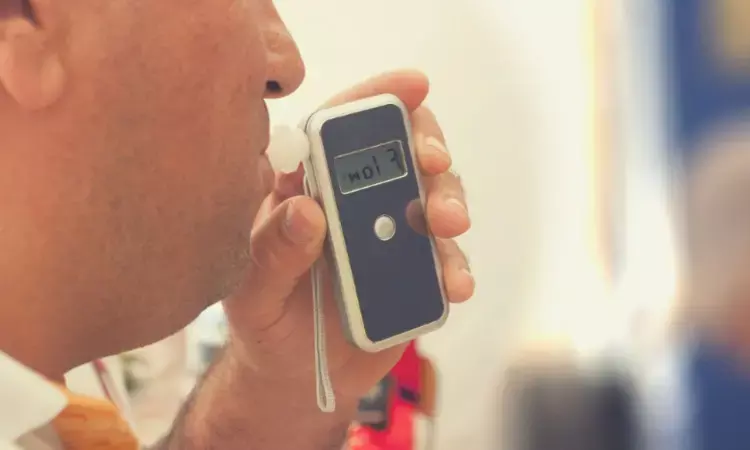- Home
- Medical news & Guidelines
- Anesthesiology
- Cardiology and CTVS
- Critical Care
- Dentistry
- Dermatology
- Diabetes and Endocrinology
- ENT
- Gastroenterology
- Medicine
- Nephrology
- Neurology
- Obstretics-Gynaecology
- Oncology
- Ophthalmology
- Orthopaedics
- Pediatrics-Neonatology
- Psychiatry
- Pulmonology
- Radiology
- Surgery
- Urology
- Laboratory Medicine
- Diet
- Nursing
- Paramedical
- Physiotherapy
- Health news
- Fact Check
- Bone Health Fact Check
- Brain Health Fact Check
- Cancer Related Fact Check
- Child Care Fact Check
- Dental and oral health fact check
- Diabetes and metabolic health fact check
- Diet and Nutrition Fact Check
- Eye and ENT Care Fact Check
- Fitness fact check
- Gut health fact check
- Heart health fact check
- Kidney health fact check
- Medical education fact check
- Men's health fact check
- Respiratory fact check
- Skin and hair care fact check
- Vaccine and Immunization fact check
- Women's health fact check
- AYUSH
- State News
- Andaman and Nicobar Islands
- Andhra Pradesh
- Arunachal Pradesh
- Assam
- Bihar
- Chandigarh
- Chattisgarh
- Dadra and Nagar Haveli
- Daman and Diu
- Delhi
- Goa
- Gujarat
- Haryana
- Himachal Pradesh
- Jammu & Kashmir
- Jharkhand
- Karnataka
- Kerala
- Ladakh
- Lakshadweep
- Madhya Pradesh
- Maharashtra
- Manipur
- Meghalaya
- Mizoram
- Nagaland
- Odisha
- Puducherry
- Punjab
- Rajasthan
- Sikkim
- Tamil Nadu
- Telangana
- Tripura
- Uttar Pradesh
- Uttrakhand
- West Bengal
- Medical Education
- Industry
Breath ketone analyzers non-invasively detect ketosis in adults with type 1 diabetes: Study

USA: A recent study in the Journal of Diabetes and Its Complications has pointed out that a non-invasive breath ketone analyzer may be considered as a screening tool to rule out ketosis in people with type 1 diabetes (T1D). According to Halis Kaan Akturk and colleagues, it may be a good alternative for ketone monitoring in adults with T1D, but not in children.
Diabetic ketoacidosis (DKA) is a life threatening complication of type 1 diabetes. In order to prevent DKA, ketone monitoring is essential. Though, blood ketone monitoring is an accurate way of monitoring but is expensive. To look for a less expensive method, Dr. Akturk from University of Colorado, Aurora, CO,USA, and team aimed to assess the accuracy of a breath ketone analyzer to detect ketosis in adults and children with type 1 diabetes.
To fulfill their purpose, the researchers designed a proof-of-concept, prospective study comparing breath ketone analyzer and blood ketone meter to detect ketosis.
A total of 500 measurements from 19 adults and children with type 1 diabetes were analyzed. Based on the analysis, the researchers found the following:
- There was a significant association between the breath ketone analyzer and blood ketone meter results in non-fasting adults, but not in children.
- In adults, a cut-off of 3.9 PPM on the breath ketone analyzer maximized the Youden Index with an AUC of 0.73.
- This cut-off for the breath ketone analyzer had 94.7% sensitivity and 54.2% specificity to detect ketosis (≥0.6 mmol/L in blood ketone meter).
Dr. Akturk, and colleagues concluded, "The breath ketone analyzer may be considered as a non-invasive screening tool to rule out ketosis in adults with type 1 diabetes."
Reference:
Halis Kaan Akturk, Janet Snell-Bergeon, Laura Pyle, Emily Fivekiller, Satish Garg, Erin Cobry, Accuracy of a breath ketone analyzer to detect ketosis in adults and children with type 1 diabetes, Journal of Diabetes and its Complications, 2021, 108030, ISSN 1056-8727, https://doi.org/10.1016/j.jdiacomp.2021.108030.
Dr Kamal Kant Kohli-MBBS, DTCD- a chest specialist with more than 30 years of practice and a flair for writing clinical articles, Dr Kamal Kant Kohli joined Medical Dialogues as a Chief Editor of Medical News. Besides writing articles, as an editor, he proofreads and verifies all the medical content published on Medical Dialogues including those coming from journals, studies,medical conferences,guidelines etc. Email: drkohli@medicaldialogues.in. Contact no. 011-43720751


